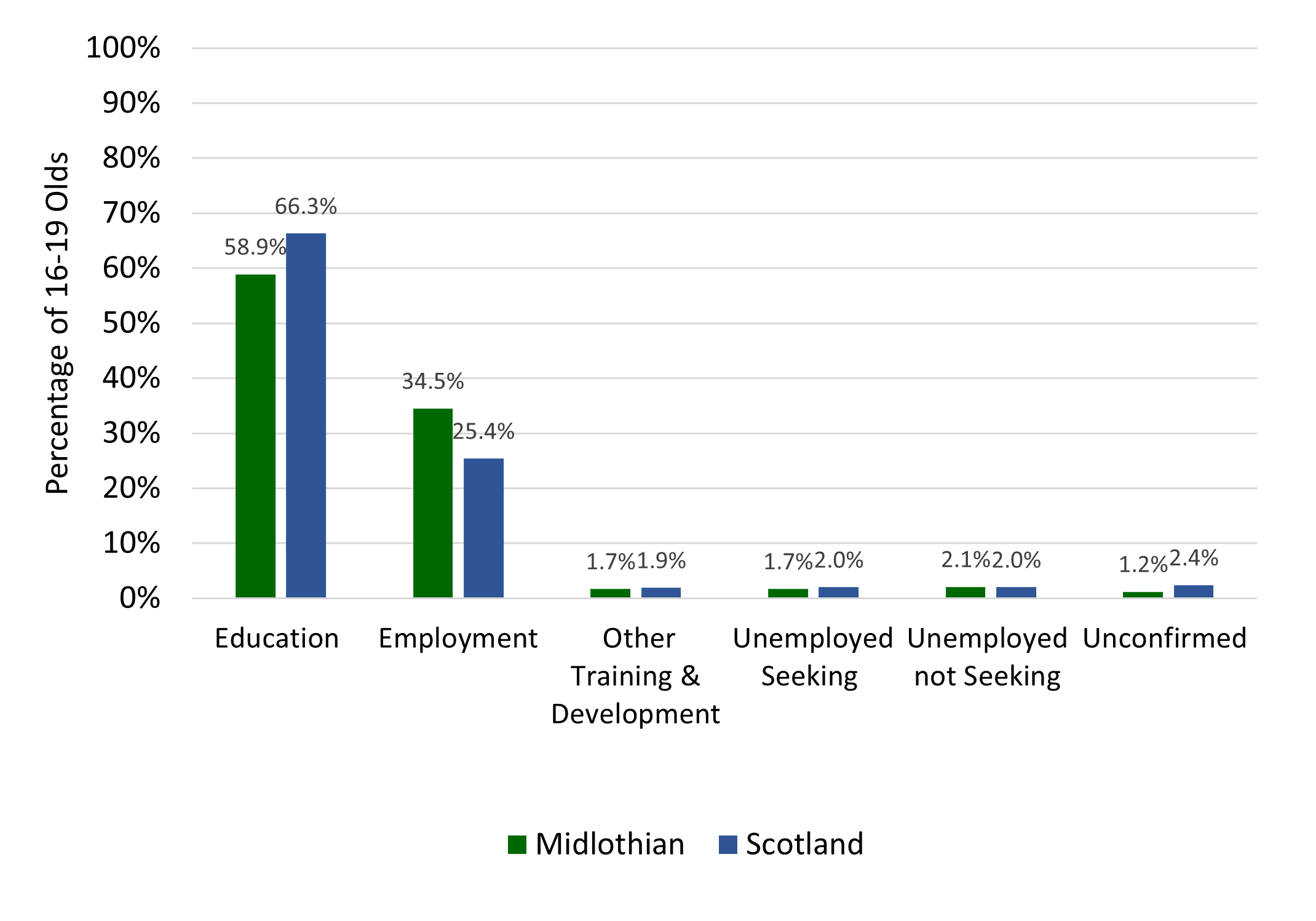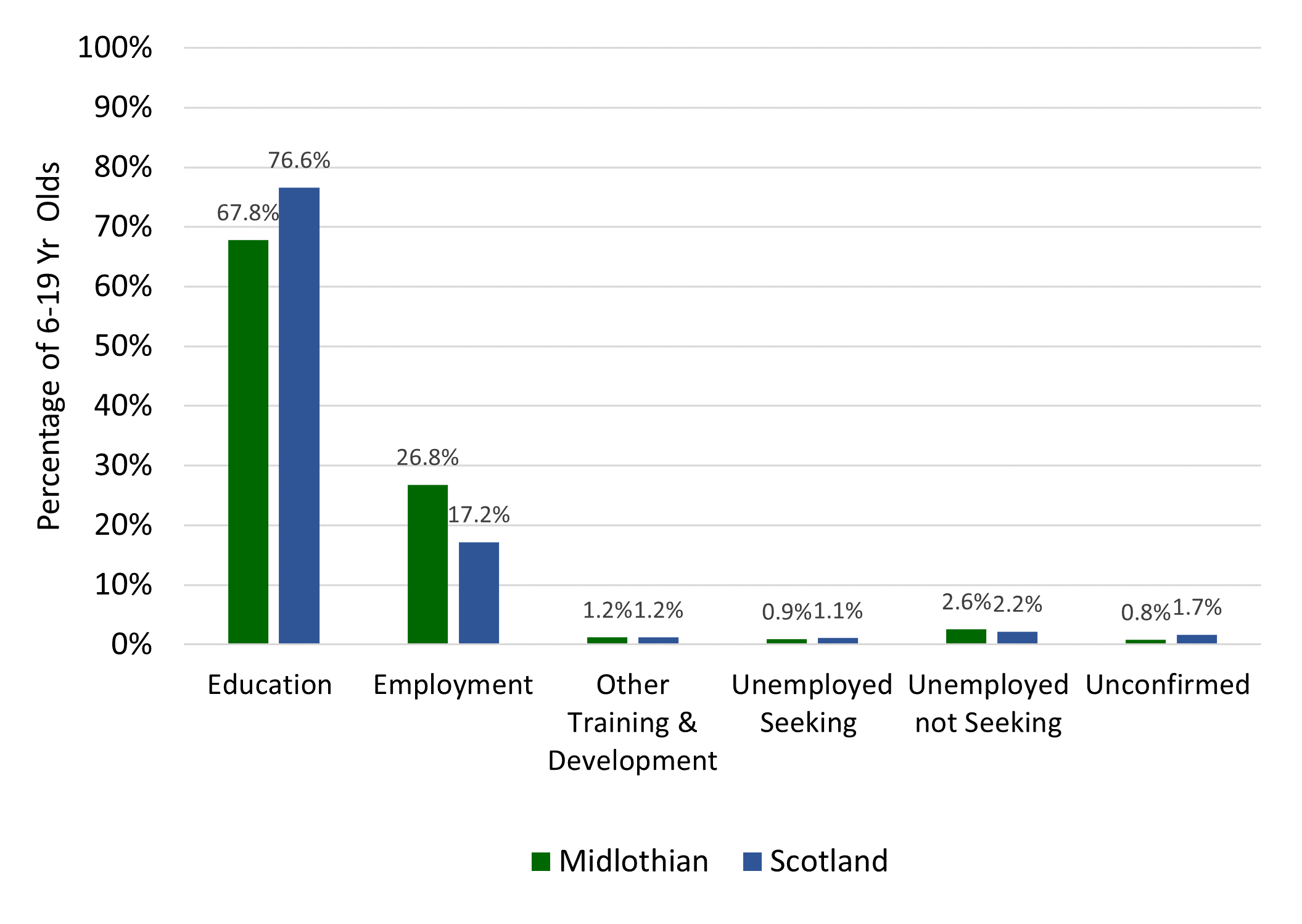Education & Qualifications
Education is one of the most important modifiable social determinants of health.
A person’s level of education is an important influence on health and has a major role in shaping health and wellbeing over a lifetime. Education has a wide impact on health and wellbeing in terms of developing values, emotional intelligence, self-esteem, and social functioning skills and should not just be focused on formal qualifications. Socioeconomic inequality can be seen across the education system, from early years to higher education and beyond (Public Health Scotland, 2023).
School Leavers and 16-19-year-olds
In 2021/22, 95.5% of school leavers in Midlothian were in a positive destination e.g., training, employment, volunteering and further and higher education approximately three months after the end of the school year (Scottish Government, 2023). This is similar to the national average (95.7%) (Scottish Government, 2023).
Between 1 April 2022 and 31 March 2023, a total of 95.4% of 16–19-year-olds were participating in education or employment: 63.1% in education and 30.8% in employment (Skills Development Scotland, 2023). This is compared to 71.3% in education and 21.4% in employment nationally. Over the last six years, Midlothian has consistently exceeded the national proportion of young people entering employment and it is higher for males (34.5%) compared to females (26.8%) (Skills Development Scotland, 2023). There is no current data to define what proportion of these young people are entering ‘good work’.
Percentage of 16-19 year old males participating in education, training and employment (2023)

Percentage of 16-19 year old females participating in education, training and employment (2023)

Participation varies across Midlothian. While the proportion of young people in employment or education in Dalkeith has gradually been increasing it remains the intermediate zone with the lowest participation rate (90.4%) compared to neighbouring Eskbank (97.2%), and Penicuik North (97.9%), (Skills Development Scotland, 2023). A 7.9%-point gap exists between participation in the 20% most deprived (90.7%) and the 20% least deprived (98.6%). (Skills Development Scotland, 2023).
There has been a slight increase in people aged 16-19 who are unemployed and not seeking employment (2.3% in 2022/23 compared to 1.9% in 2021/22). There has been a slight decrease in those unemployed and seeking employment (1.3% in 2022/23 compared to 1.7% in 2021/22), (Skills Development Scotland, 2023). The proportion of young people with an unknown status is 1% (38 people). This is the lowest it has been.
Qualification Levels
There is a lower proportion of people in Midlothian with HNDs, degrees, or degree-level qualifications (SCQF level 8 & 9) than in Scotland overall (Office for National Statistics, 2022; Scottish Government, 2023).
- 51.7% of the working age population have a qualification at NVQ level 4 or above, which is similar to Scotland (50%).
- 4.4% of Midlothian school leavers have no qualifications, which is lower than the national average (7.8%).
Edinburgh College has over 32,000 students. It has a campus based in Midlothian. There were 3,821 Midlothian Enrolments in 2021/22. This is an increase from 2,204 in 2018/19 (Midlothian Profile, 2022 PDF). Of these enrolled students 36% were aged 25 and over, and 27% had a disability: a specific learning difficulty such as dyslexia, dyspraxia or ADHD (42%), followed by a mental health condition (28%), and a social/communication impairment such as Asperger’s syndrome/other autistic spectrum disorder (11%) (Midlothian Profile, 2022 PDF).
Adult Literacy
The Midlothian Council Lifelong Learning & Employability Additional Learning Needs Service worked with 157 adults in the year 2021/22 (Midlothian Profile, 2022 PDF). This compares to 97 adults in the previous year. The lower numbers reflect the fact that Lifelong Learning and Employability staff were delivering critical services during the Covid-19 pandemic and maintaining contact with only those deemed to be most vulnerable.
Most participants were female (72%). The most common first language of people attending these courses was Polish or Arabic - these figures pre-date the Ukraine visa schemes (Midlothian Profile, 2022 PDF).
